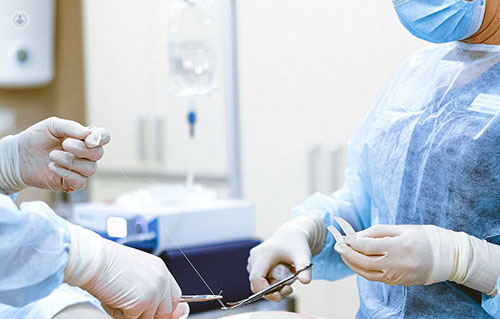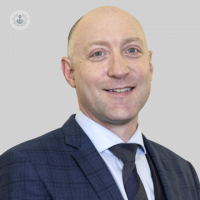Neurosafe: An expert's guide
Written by:In his latest online article Professor Greg Shaw gives us his insights into NeuroSafe. He explains what it is, the benefits, the technique and how it has improved radical prostatectomy.

What is NeuroSAFE?
NeuroSAFE is a surgical technique that enables the surgeon to examine the prostate's surface for cancer cells during the operation. If cancer cells are detected on the surface, the surgeon can immediately remove additional tissue in the same procedure. This examination is conducted by promptly generating frozen section samples, which are then examined by a pathologist. If any further tissue removal is necessary, it can be performed while the patient is still under anaesthesia during the same operation.
What are the benefits of the NeuroSAFE technique?
MRI scans are effective in detecting prostate cancer, but they have limitations in precisely determining the cancer's boundaries. During radical prostatectomy, the surgeon's goal is to remove the outer layers of the prostate, which contain the delicate nerves responsible for erections and urine control. This process, known as nerve-sparing, greatly impacts the patient's post-surgery erectile function and urinary control. If the MRI indicates potential nerve involvement, nerve-sparing is avoided.
However, there are instances when the MRI results are overly cautious, leading to unnecessary removal of nerves that could be safely spared. The NeuroSAFE technique addresses this issue by providing the surgeon with additional certainty. It enables the identification and preservation of nerves that appear to be affected by cancer on the MRI without compromising the risk of leaving cancer cells behind. By using NeuroSAFE, the surgeon can optimize nerve-sparing, increasing the likelihood of satisfactory erectile function and quicker recovery of urinary control for the patient.
Is it safe?
The method appears to be safe. Having conducted more than 200 NeuroSAFE procedures, I've observed that the additional 45-60 minutes required for the analysis during the operation does not seem to lead to any extra complications.
What's involved in the NeuroSAFE technique?
The process entails close collaboration between the surgeon and a skilled team of technicians, responsible for preparing the samples for the pathologist's examination. The pathologist assesses the samples and communicates to the surgeon whether cancer cells are visible at the excised prostate's edge. If cancer cells are detected, the surgeon will proceed to remove the nerves on that side to minimize the risk of cancer cells being left behind. Fortunately, in the majority of cases, the pathologist's report confirms that the edge is clear, ensuring that the nerves have been successfully spared, and the patient's well-being is safeguarded.
How has the NeuroSAFE technique improved radical prostatectomy procedures?
The NeuroSAFE procedure appears to be a secure approach to enhance the preservation of nerve tissue during radical prostatectomy. Preserving nerves is recognized to enhance a patient's chances of recovering sexual function and urinary control after the procedure. As a leader in a national study, I am investigating the cost-effectiveness of implementing this technique within the NHS (neurosafeproof.com).
Professor Greg Shaw is a highly regarded consultant urological surgeon with over 20 years of experience. You can book an appointment with him today on his Top Doctor’s profile.


